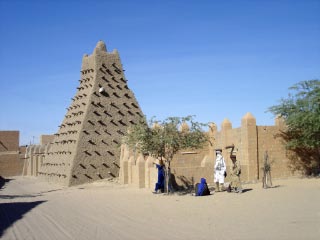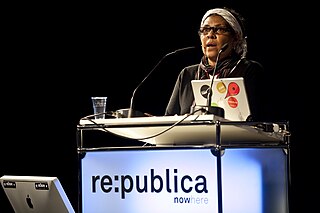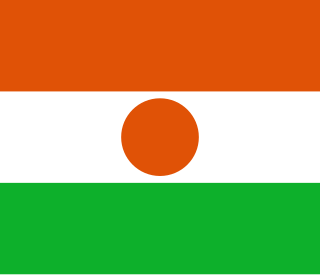
Timbuktu is an ancient city in Mali, situated 20 km (12 mi) north of the Niger River. The town is the capital of the Timbuktu Region, one of the eight administrative regions of Mali. It had a population of 54,453 in the 2009 census.

Sir George Dashwood Taubman Goldie was a Manx administrator who played a major role in the founding of Nigeria. In many ways, his role was similar to that of Cecil Rhodes elsewhere in Africa but he lacked Rhodes' thirst for publicity.

Hamani Diori was the first President of the Republic of Niger. He was appointed to that office in 1960, when Niger gained independence. Although corruption was a common feature of his administration, he gained international respect for his role as a spokesman for African affairs and as a popular arbitrator in conflicts. His rule ended with a coup in 1974.
Flora Louise Shaw,, was a British journalist and writer. She is credited with having coined the name "Nigeria".
Kay Williamson, born Ruth Margaret Williamson was a linguist who specialised in the study of African languages, particularly those of the Niger Delta in Nigeria, where she lived for nearly fifty years. She has been called "The Mother of Nigerian Linguistics." Her many publications include a grammar and dictionary of the Ijo language, a dictionary of Igbo and numerous articles on diverse topics. She is also notable for proposing the Pan-Nigerian alphabet.

The Hausa is the largest ethnic group in Africa and the second largest language after Arabic in the Afroasiatic family of languages. The Hausa are a diverse but culturally homogeneous people based primarily in the Sahelian and the sparse savanna areas of southern Niger and northern Nigeria respectively, numbering over 70 million people with significant indegenized populations in Cameroon, Central African Republic, Republic of the Congo, Ivory Coast, Chad, Togo, Ghana, Sudan, Eritrea, Equatorial Guinea, Gabon, Senegal and the Gambia

The Kaocen revolt was a Tuareg rebellion against French colonial rule of the area around the Aïr Mountains of northern Niger during 1916–17.
Marguerite Dupire was a French ethnologist who specialises on African people, and had worked extensively on the Fulani of Niger, Cameroon, Guinea, Senegal, and then after a mission in Ivory Coast, on the Serer people of Sine since 1965.

Slavery in Niger involves a number of different practices which have been practiced in the Sahel region for many centuries and which persist to this day. The Bornu Empire in the eastern part of Niger was an active part of the trans-Saharan slave trade for hundreds of years. Other ethnic groups in the country similarly had a history of slavery, although this varied and in some places slavery was largely limited to the political and economic elite. When the French took control of the area they largely ignored the problem and only actively banned the trade in slaves but not the practices of slavery. Following independence, many of the major slave holders became prominent political leaders in both the multiparty democracy period and the military dictatorship, and so the problem of slavery was largely ignored. In 2003, with pressure from the anti-slavery organization Timidria, Niger passed the first law in Western Africa that criminalized slavery as a specific crime. Despite this, slavery persists throughout the different ethnic groups in the country, women are particularly vulnerable, and a 2002 census confirmed the existence of 43,000 slaves and estimated that the total population could be over 870,000 people. The landmark Mani v. Niger case was one of the first instances where a person won a judgement against the government of Niger in an international court for sanctioning her slave status in official decisions.
Ousseina D. Alidou is an Africanist scholar specialising in the study of Muslim women in Africa.
Mariama Hima Yankori is a Nigerien film director, ethnologist and politician. She became the first female Nigerien film director in the 1980s, was State Secretary of Promotion of Women and Protection of Children, and later the first female Nigerien ambassador to France.
Aïcha Aminata Laïla Fofana was a Malian translator and author. With Mariage: on copie (1994), she became the first woman in Mali to publish a novel. A women's rights activist, her writings are aimed at improving the social conditions for women in Mali.
Aïchatou Boulama Kané is a Nigerien politician. She served as Minister of Foreign Affairs of Niger from 2015 to 2016 and has been Minister of Planning since 2016.

Aissa Diori also known as Aïchatou Diori was the wife of Hamani Diori and the First Lady of Niger. She amassed a large wealth through corruption, including high-priced real estate. She was killed in the 1974 Nigerien coup d'état.

Sylvia Hope Leith-Ross was an English anthropologist and writer who worked primarily in Nigeria.
Bouli Ali Diallo is a Nigerien academic and activist.

Sokari Ekine is a Nigerian activist, blogger and author. She worked as a journalist at the Pambazuka News and has also written for Feminist Africa and New Internationalist. Ekine kept a blog between 2004 and 2014 in which she covered a number of topics including LGBTI rights, women's rights, and environmental issues. She has co-written or edited four books, and taught English to school children in Haiti.

Rakiatou Christelle Kaffa-Jackou is a Nigerien aeronautical engineer and politician who has served as Minister for Population since 2016.












